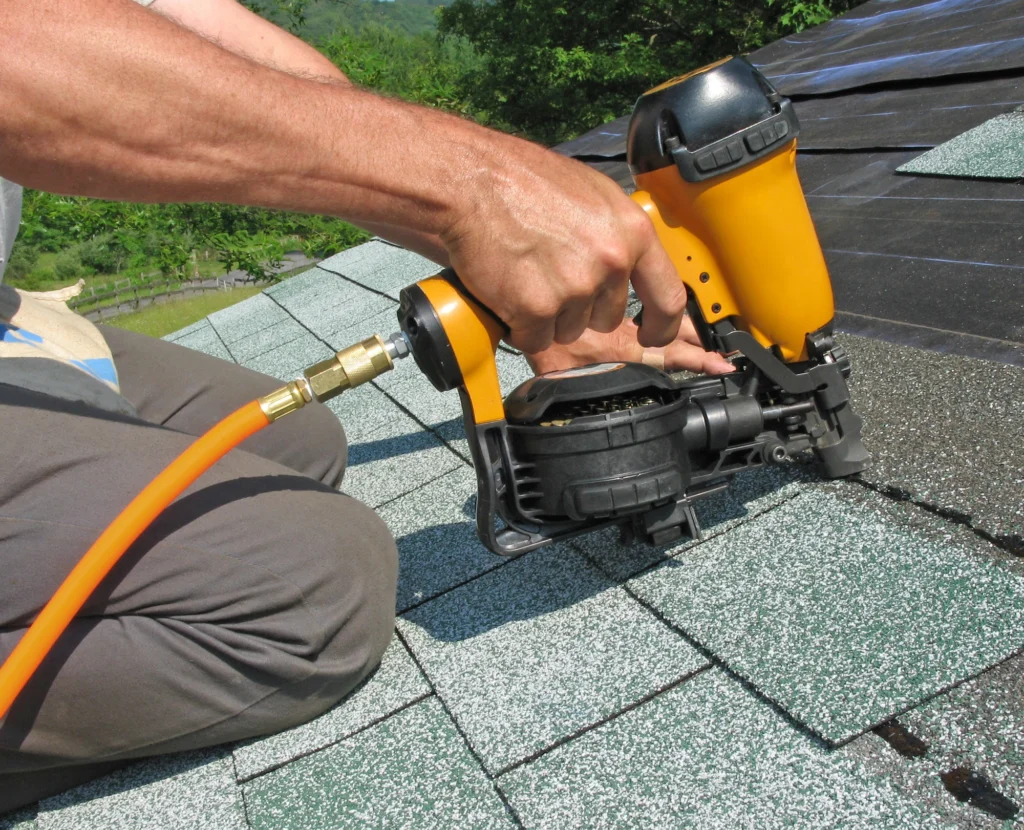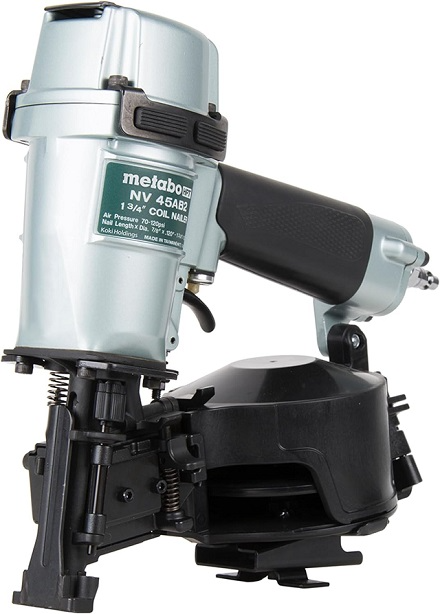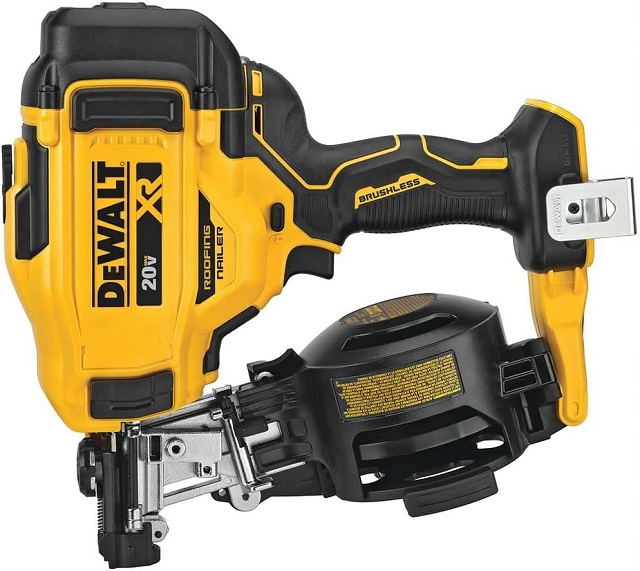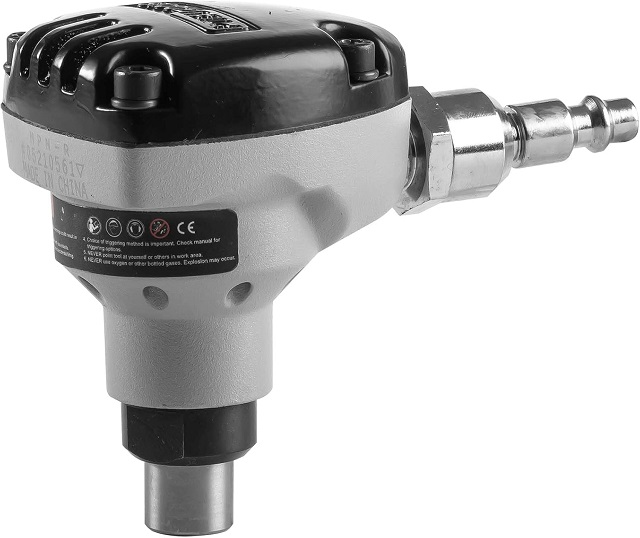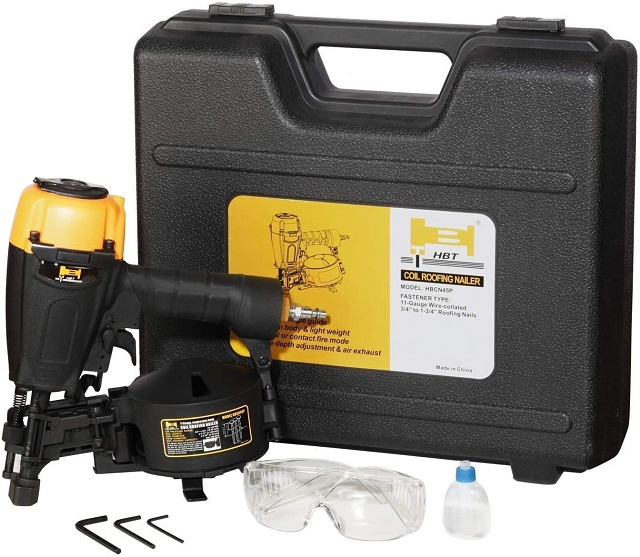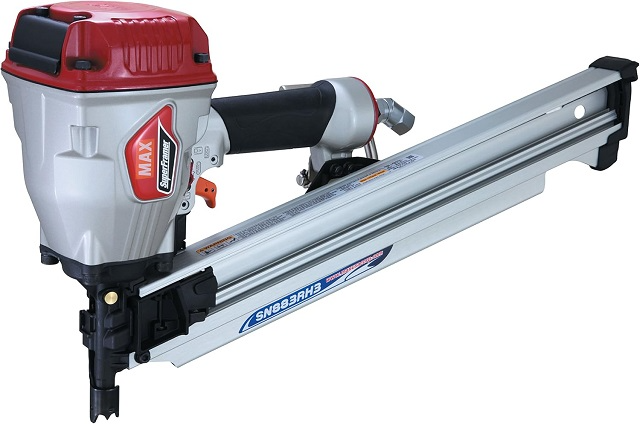Replacing or repairing a roof is easier, safer, and more efficient when you have the right tools. At Ranch Roofing, we have a wide variety of tools and equipment on hand to tackle any roof-related tasks. If you’re planning to handle some roof repairs on your own or even replace a section or two, having the right roofing nailer (aka roofing nail gun) at your disposal will make a big difference.
There are many types of nail guns, and not all of them are recommended for use on a roof. Even among the most common types of roofing nailers, you’ll have lots of options to choose from.
In this guide, we’ll walk you through the best roofing nailers and nail guns, breaking down their features so you can make an informed decision. Whether you’re looking for a high-powered pneumatic nail gun, a versatile coil nailer, or something budget-friendly for some quick repairs, we’ve got you covered.
In this article:
- Types of Roofing Nailers and Nail Guns
- How to Choose the Right Nail Gun or Nailer for Your Roof
- Nail Guns You Shouldn’t Use for Roofing Jobs
- The Best Roofing Nailers and Nail Guns
- Frequently Asked Questions
Types of Roofing Nailers and Nail Guns
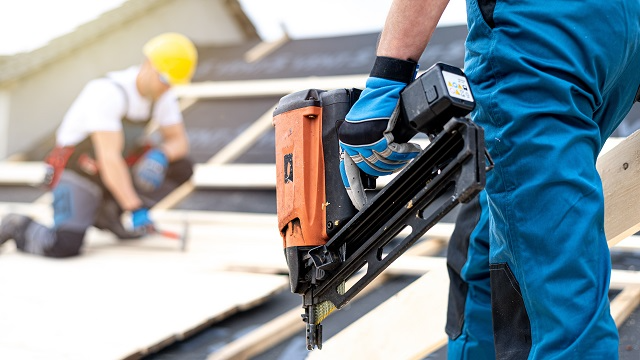
If you search for nail guns, you’ll get a wide variety of results. Some types aren’t right for roofing, but here are some that are:
Pneumatic Nail Guns
Professional roofers use pneumatic nail guns most frequently due to their power and speed. These workhorses are powered by compressed air, so for replacing an entire roof, a pneumatic nail gun makes the job quicker and simpler.
The main drawback is that they require an air compressor, so this is one more piece of equipment you need to have on hand. You’ll also need to work around the hoses and the extra noise the compressor makes.
Coil Nailers
The coil nailer is the most common type of nail gun used on roofs. Coil nailers are lighter and less bulky than pneumatic nailers and don’t use a compressor.
You can purchase roofing nails arranged in a coil, which is what the coil nailer will use. This minimizes the need to reload the gun frequently.
Mini Roofing Nailers
If you’re working in a tight space or if you’re just replacing a few shingles, a mini roofing nailer might be your top choice. These are lightweight and compact, and they tend to be less expensive than their full-sized counterparts.
However, this isn’t the best nail gun to use for replacing a larger section of a roof. Mini roofing nailers are not particularly powerful, which can slow you down.
Stick Nailers
Stick nailers, also called strip nailers, use nails arranged in a straight line. They’re versatile, so you can use them for a variety of projects, not just roofing. They offer good precision control, though they do tend to be bulkier than coil nailers.
The drawback is that they’re not the best option for most roofing projects. If you’re only doing a minor repair or replacing a few shingles, though, they can work well. We’d recommend this type of nail gun if you want to be able to perform some simple roof repairs but also need a nail gun for other projects around the house.
Cordless Roofing Nail Guns
Cordless nail guns appropriate for a roofing project are usually coil nailers. If you want to have the most mobility possible while working, a cordless coil nailer would probably be your best choice.
Cordless nail guns run on batteries, so you don’t have to worry about cords or hoses. However, you do want to keep an eye on the battery life to ensure it doesn’t run out of power at a critical point in your roofing project.
Here’s a table to help you decide which type of roofing nailer might be right for you.
| Type of Nail Gun | Pneumatic Nail Gun | Coil Nailer | Stick Nailer | Mini Roofing Nailer |
| Weight | Heavy | Moderate to heavy | Moderate to heavy | Lightweight |
| Ideal Uses | Full roof replacements | Roofing repairs and replacements | General construction, limited roofing | Small roofing repairs |
| Pros | Fast, powerful | High capacity | Versatile | Easy to use |
| Cons | Requires compressor | Can be heavy, requires compressor if not cordless | Requires frequent reloading, bulky, not ideal for roofing | Not ideal for large projects, has low power |
How to Choose the Right Nail Gun or Nailer for Your Roof
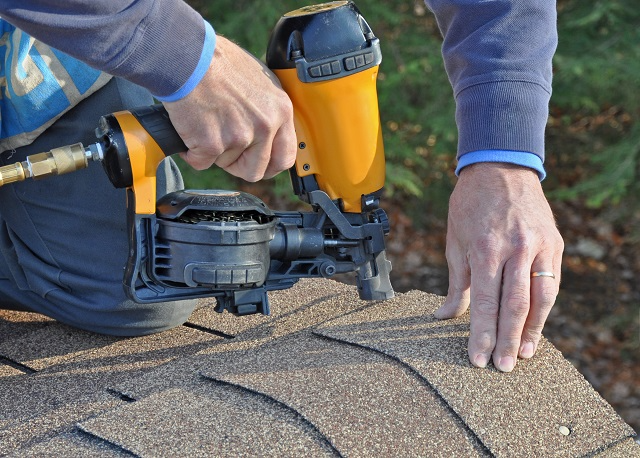
Choosing the right nail gun for your roofing project can feel overwhelming. Here are some of the factors you’ll want to keep in mind as you look at the different types available.
Your Project Scope
If you’re planning on replacing your roof or embarking on another large roofing project, a pneumatic nail gun, preferably a coil nailer, will be a good choice. Thanks to the air compressor, this gun has a high capacity and will have the power you need.
On the other hand, if you’re only planning to repair a small section of your roof or attach a few shingles, a mini roofing nailer might be the right choice. A versatile stick nailer is another possibility, particularly if you have other projects in mind.
Your Preferred Power Source
Roofing nail guns run on one of two types of power sources. Pneumatic guns use an air compressor, while cordless guns use a battery and don’t require cords or hoses.
Pneumatic roofing nail guns offer consistent power and speed, making them ideal for heavy-duty roofing jobs. However, they require an air compressor, which increases expenses and set-up time and decreases mobility up on the roof.
Cordless nailers offer more mobility and are easier to use in the sense that you can move around unimpeded. They don’t have as much power as a pneumatic nail gun, though, and the battery might need recharging if you’re working on a longer project.
Nail Capacity
Depending on your project, you’ll be using nails that come in either a coil or a strip. Coil nailers can hold a large number of nails in a coil. The most common quantity for roofing nails is 120 nails, so you won’t be slowed down by constant reloading.
A stick nailer uses strips of nails that might contain 20 or 30 nails. If you’re working on a small project, this isn’t a problem, but larger projects need frequent reloading, which is inconvenient and will slow you down.
Weight and Maneuverability
Pneumatic nailers are heavier and more cumbersome to use than their cordless counterparts. In general, mini roofing nailers are the lightest options available and best for small projects where you want to be able to move around quickly and easily.
Cordless coil nailers are next in line in terms of weight, with strip nailers being the heaviest and least convenient to use. For many people, this isn’t going to be the main feature to consider. However, if you’re working in a smaller area or if you’re not comfortable maneuvering around on the roof with heavy equipment, a lighter and simpler nail gun may be your best bet.
Nail Guns You Shouldn’t Use for Roofing Jobs
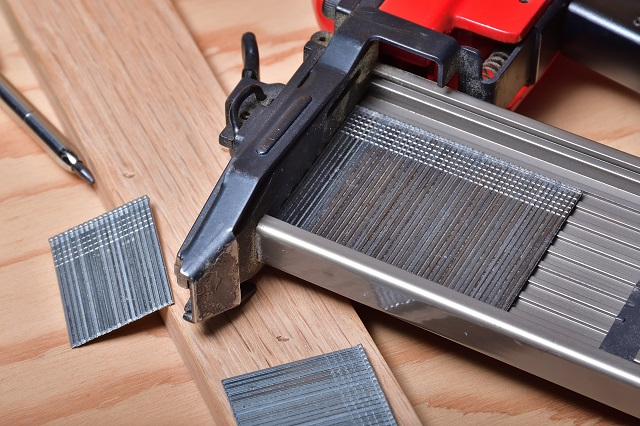
There are plenty of nail guns on the market that simply aren’t appropriate to use for roofing. If you already have one of these or are considering one for purchase, be aware that it probably won’t work well for your roofing project.
- Finish nailers. These are for interior work, mainly installing trim and baseboards, and they use small nails. They are great for finish work, but not for exterior projects that require larger nails and more power.
- Brad nailers. These nail guns are good for woodworking projects and use very small nails. They’re completely unsuitable for any type of roofing project.
- Framing nailers. These can actually be used for roof decking, where large nails are needed. However, they’re overkill for most roofing repairs; you wouldn’t want to use the large nails that framing nailers use to secure shingles.
- Staple guns. These aren’t really nail guns, but some people use staple guns as makeshift nail guns on small or lightweight construction projects. The staples aren’t strong enough for any type of roofing repair.
The Best Roofing Nailers and Roofing Nail Guns
To help you find the best nail gun for your roofing project, we’ve chosen the best roofing nailer in each category below. We compared each nailer’s value, customer reviews and satisfaction, and ability to get the job done.
Best Pneumatic Nail Gun: Metabo HPT Roofing Nailer
The Metabo HPT Roofing Nailer is our top pick among the many pneumatic nail guns. This is a coil nailer, so you can use coils of nails between 7/8 and 1 3/4 inches long. At only 5.5 lbs, this roofing nail gun is manageable and easy to maneuver, though you will need to use it with an air compressor.
It has a quick driving system, up to three nails per second, and you can adjust the drive depending on how deep you need your nails to go. The push lever is carbine-tipped to withstand wear and tear. Its convenient and simple side-loading magazine makes it easy to reload the nails.
Amazon offers the Metabo HPT Roofing Nailer along with nails, a hose, and a compressor in a bundle, which is convenient if you don’t have any of the accessories.
Otherwise, you might choose to buy them separately:
Best Cordless Coil Nailer: DeWALT Cordless Coil Roofing Nailer
The DeWALT Cordless Coil Roofing Nailer takes the top spot among cordless roofing nail guns. It weighs 6.7 lbs, which is fairly lightweight but heavier than some of the other coil nailers on the market.
It comes with a 20V rechargeable battery with up to 500 nails per charge, depending on the materials and other factors. The DeWALT Cordless Coil Roofing Nailer has the capacity for two batteries to extend the time between charing.
The nailer has a bump mode for increased efficiency and a brushless motor for increased runtime. The nail tray adjusts easily to accommodate a variety of nail sizes and can hold up to 120 wire collated roofing nails.
Here are some of the accessories you might want to look at that are compatible with the DeWALT Cordless Coil Roofing Nailer:
Best Mini Roofing Nailer: MPN-R Mini Roofing Palm Nailer
Our favorite mini roofing nailer is the MPN-R Mini Roofing Palm Nailer. If you’re working in a tight spot or you’re just doing some quick repairs, this little nailer might be exactly what you need. It’s ideal for reaching areas under the overhangs or under eaves, and it’s also a versatile tool if you’re installing vinyl siding.
The MPN-R Mini Roofing Palm Nailer is easy to use—simply place a nail in the magnetic strip and drive the nail in to the right depth. You don’t need to have the entire coil or strip attached. It will work with nails of any length with heads up to 0.49 inches.
This mini roofing nailer is air-powered, so you will need an air compressor. It weighs only 1.17 lbs, making it extremely easy to maneuver and use, even if you have less than six inches of space.
If you’re looking for a mini palm nailer and this isn’t the perfect one for you, here are three others you might consider:
Best Budget Nail Gun: HBT Coil Roofing Nailer with Magnesium Housing
The HBT Coil Roofing Nailer with Magnesium Housing makes the grade for a low-priced yet high-quality coil roofing nailer. It’s lightweight and easy to use, and it’s a good value for its cost. It comes with a bottle of oil, three hex wrenches, and a carrying case.
This nailer’s magnesium housing is lightweight and durable. It has a tool-free adjustable depth control to help you set your nails properly and an adjustable shingle guide to make consistent spacing a breeze.
As far as wear and tear go, you’ll benefit from the wear guards and the carbide inserts. Weighting only 4.93 lbs, this compact nailer is easy to maneuver. You will need an air compressor and hosing to use it.
Some accessories you might need include:
- Grip-Rite 1 1/4 Inch Roofing Nails
- Hromee 100-foot Polyurethane Air Hose
- Aardvisa 25-foot Recoil Air Hose
Best Stick Nailer: MAX USA CORP SuperFramer
The MAX USA CORP SuperFramer is our top pick for those looking for a more versatile stick nailer. This one weighs 7.9 lbs, which is lightweight for this type of roofing nailer. It comes with a tangle-free swivel plug and dial-adjustable depth control. It also has an open nose for jam clearance.
It is air-powered and requires an air compressor. This strip nailer comes with a rafter hook, so you can easily set it down as you work. There is a bit of a learning curve with how much pressure to apply, but it’s easy to use overall, especially if you have experience using roofing nail guns.
Keep in mind that you’ll need to use strip nails with this type of nail gun. Here are two to consider:
Frequently Asked Questions
What kind of nail gun do roofers use?
Professional roofers typically use pneumatic coil nailers because they’re powerful and allow for quick installation. Some use cordless coil nailers because they’re easy to use and maneuver around on the roof.
What is the best type of roofing nails?
We usually recommend stainless steel or galvanized roofing nails because they’re rust- and corrosion-resistant.
How deep should roofing nails go?
Roofing nails need to go all the way through the shingle and at least 3/4” into the roofing deck. This will prevent the shingles from coming loose.
How many nails should be used per shingle?
This depends on the specifics of the shingles, the slope of your roof, and your local climate. We recommend four to six nails per standard shingle to provide maximum stability and prevent the shingles from peeling or being blown upwards.

